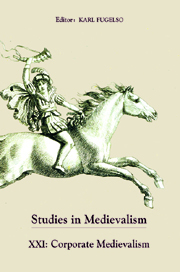Book contents
- Frontmatter
- Acknowledgments
- Contents
- Title in the Series
- Editorial Note
- I Corporate Medievalism: Some Perspective(s)
- Lives of Total Dedication? Medieval and Modern Corporate Identity
- Reincorporating the Medieval: Morality, Chivalry, and Honor in Post-Financial-Meltdown Corporate Revisionism
- Medievalism and Representations of Corporate Identity
- Knights of the Ownership Society: Economic Inequality and Medievalist Film
- A Corporate Neo-Beowulf: Ready or Not, Here We Come
- Unsettled Accounts: Corporate Culture and George R. R. Martin's Fetish Medievalism
- II Interpretations
- III Response
- Notes on Contributors
- Title in the Series
A Corporate Neo-Beowulf: Ready or Not, Here We Come
from I - Corporate Medievalism: Some Perspective(s)
Published online by Cambridge University Press: 05 February 2013
- Frontmatter
- Acknowledgments
- Contents
- Title in the Series
- Editorial Note
- I Corporate Medievalism: Some Perspective(s)
- Lives of Total Dedication? Medieval and Modern Corporate Identity
- Reincorporating the Medieval: Morality, Chivalry, and Honor in Post-Financial-Meltdown Corporate Revisionism
- Medievalism and Representations of Corporate Identity
- Knights of the Ownership Society: Economic Inequality and Medievalist Film
- A Corporate Neo-Beowulf: Ready or Not, Here We Come
- Unsettled Accounts: Corporate Culture and George R. R. Martin's Fetish Medievalism
- II Interpretations
- III Response
- Notes on Contributors
- Title in the Series
Summary
Commoditization appears as an issue in some Beowulf films – no real surprise there, since it appears in the poem itself – but a particularly interesting instance occurs in director Hal Hartley's No Such Thing (2001). A ruthless corporate-media boss can't wait to exploit both the Monster and the girl who finds him: a satiric Beowulf story redesigned to sell for a different audience and reconstructed around a new theme. The film suggests that the corporate monster can and will show far more cold-blooded evil than the natural one – neomedievalism turns to critique of corporate culture. While filmmakers have skewered corporate culture before, that doesn't mean they shouldn't do it again, and they have seldom done so in a way so intelligently allusive and literary.
A marvelous and under-appreciated cinematic revision of the Anglo-Saxon epic, placing the Beowulf story in near-future New York and Iceland, No Such Thing throws particular emphasis on the idea that good and evil are both matters of continual personal and organizational choice. A New York reporter goes to Iceland to learn what happened to her boyfriend, supposedly killed by a monster. She finds the Monster; he probably did kill her boyfriend, but she learns that he suffers from depression, centuries-old exhaustion, and alcoholism, and all he really wants is to die. She returns with him, and the media briefly exploit them both terribly, until she finds the mad scientist who can help the Monster get his wish.
- Type
- Chapter
- Information
- Studies in Medievalism XXICorporate Medievalism, pp. 49 - 56Publisher: Boydell & BrewerPrint publication year: 2012



